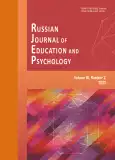Value and sense component of books content for primary school children
- Autores: Mitina G.V.1, Goncharuk P.I.1
-
Afiliações:
- Pacific National University
- Edição: Volume 16, Nº 2 (2025)
- Páginas: 7-29
- Seção: Educational and Pedagogical Studies
- ##submission.datePublished##: 30.04.2025
- URL: https://journal-vniispk.ru/2658-4034/article/view/302682
- DOI: https://doi.org/10.12731/2658-4034-2025-16-2-687
- EDN: https://elibrary.ru/PFPYQV
- ID: 302682
Citar
Texto integral
Resumo
Background. The article emphasizes the importance of forming stable moral principles in children in the context of the uncertainty of modern moral guidelines. In this regard, literature is not only a source of knowledge, but also an important means of transmitting values that contribute to the development of qualities such as compassion, empathy, and social responsibility.
The authors set out to analyze and identify the main values and meanings embedded in children's literature, based on the results of a survey conducted among younger schoolchildren. The novelty of the work lies in the integration of theoretical foundations related to value-semantic content and empirical data, which emphasizes the importance of conscious choice of literary works for the formation of key values in primary school children. The study focuses on specific values, such as friendship, hard work, and responsibility, as well as their reflection in contemporary books available to children. In this context, the work offers new approaches for educators and parents, allowing them to more purposefully select literature that contributes to the upbringing and harmonious development of the child's personality.
Materials and methods. For this study, we analyze the data collected from normative documents, psychological, pedagogical and methodological literature, and works of fiction. We used questionnaire survey about primary school children's reading preferences.
Results. The research broadens horizons for primary school teachers, parents of younger students, students receiving pedagogical education and all those who strive to instill in children a deep and meaningful attitude to literature. Detailed study of literary works allows not only to deepen the educational process, but also to inspire children to think, forming their internal moral guidelines.
Scope of application. The results of the study can be useful both while primary school teachers training and in practice – while teaching literature lessons and conducting extracurricular activities with primary school children. During them younger students will be learning to work with children's books.
Sobre autores
Galina Mitina
Pacific National University
Autor responsável pela correspondência
Email: gvmitina@mail.ru
ORCID ID: 0000-0001-7829-9856
Código SPIN: 9816-7317
Scopus Author ID: 57211781804
Researcher ID: LZG-2260-2025
PhD in Pedagogical Sciences, Associate Professor, Director of the Pedagogical Institute
Rússia, 136, Tikhookeanskaya Str., Khabarovsk, 680035, Russian FederationPolina Goncharuk
Pacific National University
Email: 2021101256@togudv.ru
Bachelor
Rússia, 136, Tikhookeanskaya Str., Khabarovsk, 680035, Russian FederationBibliografia
- Andryushina, I. I. (2014). The art of artistic reading and storytelling in the works of E. A. Fleerina. Management of Preschool Education, (6), 100–111.
- Bal, P. M., & Veltkamp, M. (2013). How does reading literary fiction influence empathy? An experimental study of the role of emotional transportation. PLOS ONE, 8(10), e76259. https://doi.org/10.1371/journal.pone.0076259
- Kolchikova, N. L. (2020). Visualization of literary text as a means of developing student reading literacy. Bulletin of the Khakass State University named after N. F. Katanov, (4), 107–114. EDN: https://elibrary.ru/VCMCWU
- Leontiev, A. N. (2016). Pedagogy of Common Sense. Moscow: Smysl. Retrieved from https://www.litres.ru/book/a-a-leontev-10625554/pedagogika-zdravogo-smysla-56435853/chitat-onlayn (accessed: December 14, 2024).
- Leontiev, D. A. (1998). Value representations in individual and group consciousness: types, determinants and changes over time. Psychological Review, (1), 13–25.
- Maslow, A. (2019). Motivation and Personality (3rd ed.). Translated from English. Saint Petersburg: Piter. 400 p.
- The Problem of Man in Western Philosophy. (1988). Moscow: Progress. 550 p.
- Rokeach, M. (1973). The nature of human values. Free Press, (5), 20–28.
- Rubinshtein, M. M. (1950). Cultivating reading interests in schoolchildren. Moscow: Uchpedgiz. 215 p. Retrieved from https://search.rsl.ru/ru/record/01006014701 (accessed: December 14, 2024).
- Tikhomirov, A. (2023). The Educational Role of Fairy Tales. Retrieved from https://mybook.ru/author/andrej-tihomirov-4/vospitatelnaya-rol-skazki/read (accessed: January 6, 2025).
- Tikhomirova, I. I. (2010). Literary characters as models of behavior for the reading child. Pedagogy of Culture, (9). Retrieved from https://pedagogika-cultura.ru/kultura-chteniya/tikhomirova-literaturnye-geroi (accessed: December 14, 2024).
- Tikhomirova, I. I. (2010). The educational potential of fiction. Pedagogy of Culture, (9). Retrieved from https://pedagogika-cultura.ru/kultura-chteniya/tikhomirova-i-i-vospitatelnyj-potentsial-khudozhestvennoj-literatury?clckid=5096a6e9 (accessed: December 14, 2024).
- Federal State Educational Standard of Primary General Education of the New Generation from July 5, 2021. (2021). Ministry of Education and Science of the Russian Federation. Retrieved from http://publication.pravo.gov.ru/Document/View/0001202107050028 (accessed: January 6, 2025).
- Shchurkova, N. E. (2009). Program of Schoolboy Education. Moscow. 51 p.
Arquivos suplementares










